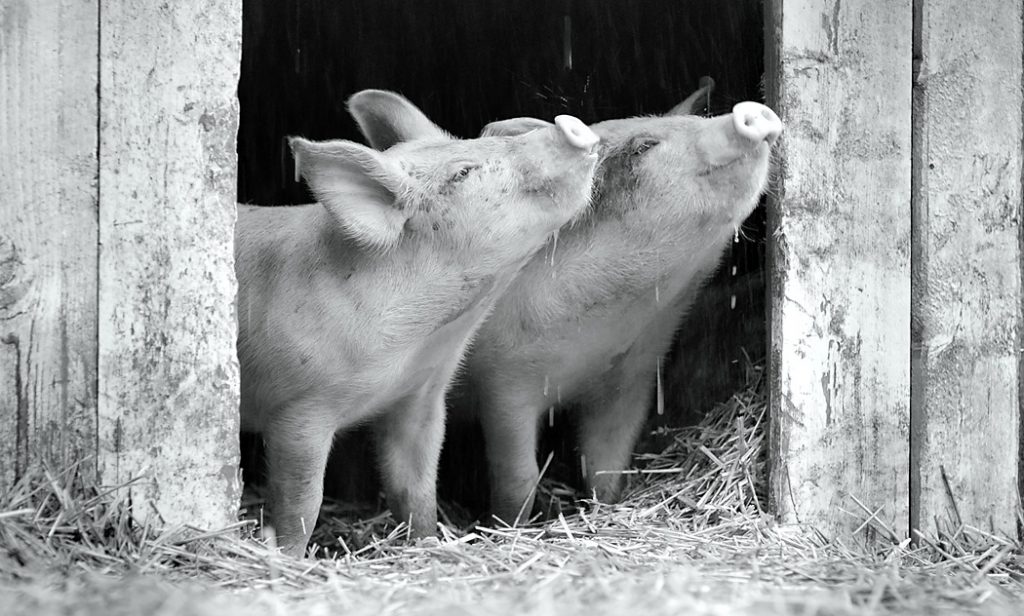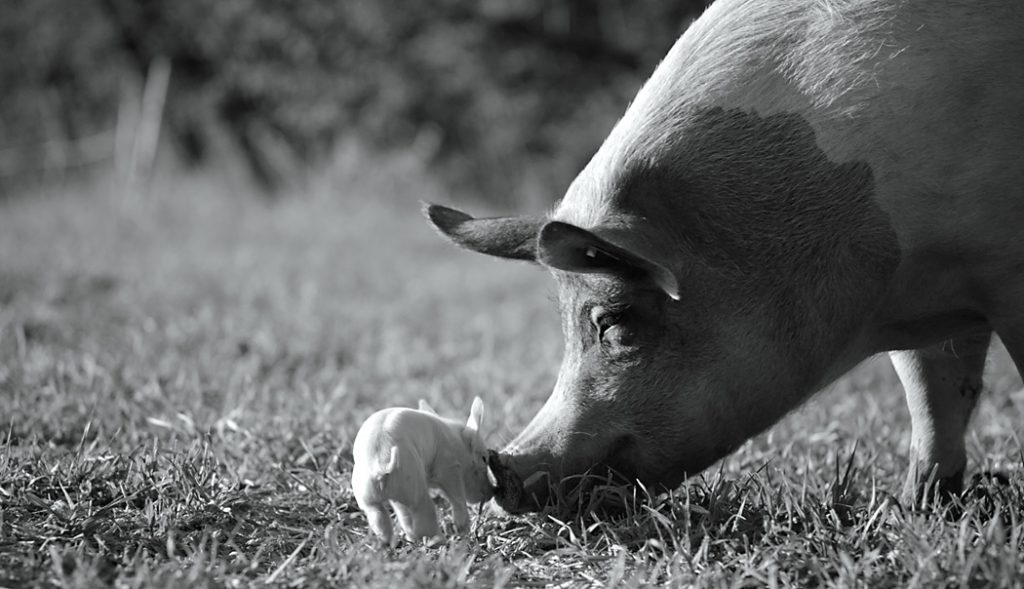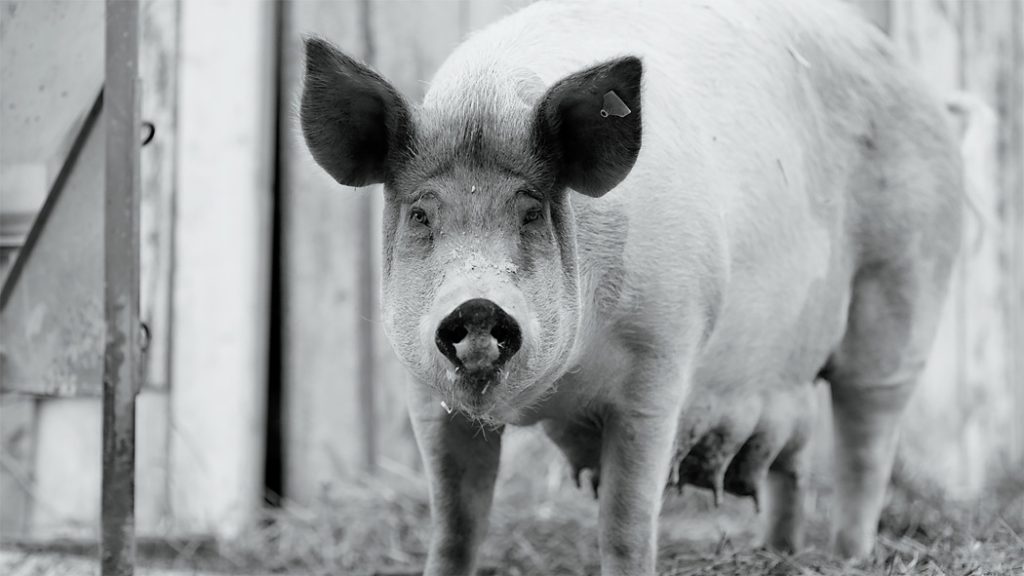
Iowa Farm Sanctuary and VegLife Des Moines are teaming up to bring Iowans a first look at Gunda, a new film from executive producer Joaquin Phoenix, before it hits theaters. This virtual premiere will be hosted by the two nonprofits through a special arrangement with the film distributors.
Gunda eloquently documents the everyday lives of farmed animals. It is shown in black and white, without words, and without music. Film director Victor Kossakovsky offers not just a mesmerizing, poetic work of art, but also a wonderful life experience. Gunda highlights the consciousness and emotional richness of all living beings while the audience gets to know the sow Gunda, her piglets, and her animal neighbors.

“Gunda is pure cinema,” says director Paul Thomas Anderson. “This is a film to take a bath in—it’s stripped to its essential elements, without any interference. It’s what we should all aspire to as filmmakers and audiences—pictures and sound put together to tell a powerful and profound story without rush. Its jaw-dropping images and sound put together with the best ensemble cast make it more like a potion than a movie.”
Director Victor Kossakovsky says he has always wanted to make a film about animals as living, feeling creatures. “Growing up I was very much a city kid,” he says, “but at the age of four I spent a few months in a village in the countryside, where I met my best friend Vasya. He was much younger than me—just a few weeks old when we met—but over time he became my dearest friend, and the times we spent together are some of the most cherished memories from my childhood. One day, when we were still young, Vasya was killed and served as pork cutlets for a New Year’s Eve dinner. I was devastated and immediately became probably the first vegetarian kid in the Soviet Union.”

A Conversation with Director Victor Kossakovsky
Historically there is an overall acceptance by humanity that we have dominion over non-humans, that their lives are inherently less valuable than ours. Do you see Gunda as a repudiation of that?
My idea is very simple: we as humans are ready to change our attitudes to our fellow beings…. Human attitudes do change over time, and I would like to think we can learn certain things from our experiences. For a few hundred years, it was important to establish respect for the value of human life. It took centuries to even acknowledge that all human beings deserve the same rights. Perhaps now we can take the next step and admit that every living creature has similar rights. Pigs, butterflies, elephants—all of them have the same rights to live on this planet. We shouldn’t always put ourselves in the center. We can do better than that. We are not totally awful. We did eventually come to the conclusion that slavery was unjust, we have started to respect the rights of women, of people of different genders, and to me that is a sign that we are increasing our understanding of the world.
How did you choose the remarkable animals in this film?
When the media talk about animals, it’s often about popularly beloved creatures like whales, pandas, dolphins, or koala bears. I didn’t want cute animals. I felt that would detract from the larger message. There are billions of pigs, and almost all of them will live a year at most. And 1.5 billion cows that we will kill after two to four years. And 50 billion chickens each year will not even live to be one year old. We don’t think about this much.
What common misconceptions do people attach to farm animals?
Our entire treatment of animals is based on misconception. In some countries there are laws stating outright that animals don’t suffer—it’s written into the very fabric of the law. This is absurd. Everyone who is in regular contact with animals knows that they feel, they have emotions, they are conscious. We know this is the truth but have tacitly agreed to disregard our empirical knowledge. Instead we deny them their natural lives…. If people believe that humans have souls, they should agree that animals have souls too.
The film has no human dialogue, no score, and no on-screen text. Can you explain why you chose to keep to animal sounds as the only audio and to not explain with captions?
Many films are made about animals, and normally, they feature people talking about them, explaining them. That takes the attention away from the animals. I didn’t want to patronize or humanize them. Films that show animal slaughter and explain all its gory detail also don’t work. It is propaganda, and people block it out. So I thought, let’s see what the camera can do on its own. Just look! Cinema is made for this, to make you see what you might not be able to see normally. Cinema can provide an emotional, experiential approach to a topic. It seemed the right approach to go back to the beginning of cinema. I didn’t want to introduce extraneous elements such as a score. I wanted to show how animals communicate. If you look closely, Gunda speaks to us. I didn’t want to drown her voice.
Why did you decide to shoot the film in black and white?
For one thing, this brings me back to the origin of cinema, to the birth of cinema. Also, depending on the circumstances, color can be overwhelming. If you see blood in color, it is too naturalistic and your attention wanders. Often, lush colors will make us focus on different things, such as the background. I didn’t want to show cute pink piglets—and believe me, they are very cute indeed. I didn’t want to seduce the viewer in that way. It felt to me like black and white makes us focus on their soul rather than their appearance.
Iowa Premiere on April 10
The virtual screening of Gunda begins at 7 p.m. on Saturday, April 10. Viewers from across Iowa and the Midwest are welcome. Advance tickets are $11 at Iowa Farm Sanctuary. Once tickets are purchased, a link to view the film will be emailed. Included with the film screening is an exclusive Q&A with executive producer Joaquin Phoenix and director Victor Kossakovsky, which will be shown following the film.
A portion of each ticket sale from this special screening benefits Iowa Farm Sanctuary. Founded in 2015 by Shawn and Jered Camp, Iowa Farm Sanctuary is a 501(c)(3) nonprofit farm-animal rescue organization located in Oxford, Iowa. Primary services include farm animal rescue, humane education, and advocacy for farmed animals. Nearly 100 rescued farm animals currently live at the sanctuary, with room to grow. Iowa Farm Sanctuary works daily to save and speak up for farm animals.
VegLife Des Moines is a 501(c)(3) nonprofit founded in 2017 whose mission is to educate consumers about the impact of their choices on animals, the environment, and people. VegLife Des Moines serves the community through various educational events. They host Des Moines VeganFest and are planning a Vegan Summer Market this year.
